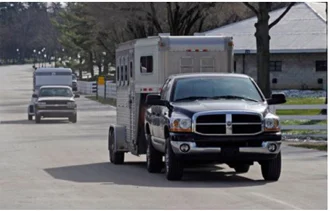Contrary to recent social media panic, the Electronic Logging Device (ELD) mandate will not significantly impact horse owners. Only drivers that are already required to log their driving records under hours-of-service (HOS) and records of duty status (RODS) requirements will be impacted by the ELD mandate.
Repealing Rapanos: Shrinking the Clean Water Act’s Jurisdiction
It is not often that a criminal appeal can change the face of American environmental law and change the jurisdiction of major environmental legislation. This is why anyone concerned with ecological diversity or clean water ought to be watching closely for the Supreme Court’s upcoming decision in United States v. Hughes. In particular, it may greatly decrease the regulatory scope of the Clean Water Act, which controls the discharge of pollutants into the “navigable waters” of the United States.
Balancing Religion with Animal Rights Laws: How the Legal World Has Addressed the Topic of Animal Sacrifice
When religion and law are in conflict, what which takes precedent? This question has plagued nations since the dawn of democracy, but not necessarily the dawn of time, as Dan Murphy explained in his recent article on the topic. Murphy noted that unlike ancient monarchies or dictatorships, most modern democracies vow to separate church and state. This separation of religion and democracy has fostered disagreement and tension between people’s beliefs across a wide variety of topicsissues. One such of those topics issue is animal sacrifice.
Donald Trump Withdraws U.S. from Trans-Pacific Partnership
Time for Serious Deliberation: Medical Marijuana and the Benefits on Kentucky’s Failing Pension System
Beyond the ongoing moral debate surrounding medical marijuana, Kentucky now faces a major financial crisis that is affecting the state’s pension system. Keeping the state's financial struggles in mind, it is time for Kentucky representatives to put aside their party preference and deliberate about the benefits legalizing medical marijuana will have on the economy.
Atlantic Sunrise Pipeline Continues Construction After DC Circuit Decision
Due to the catastrophic failures of all natural gas transportation methods, such as spillages and harmful chemicals escaping barrels, people are wary of new pipelines. Accordingly, there has been a recent, and large, controversy regarding the installation of the new pipeline, Atlantic Sunrise. Atlantic Sunrise runs through ten counties of Pennsylvania and will hopefully provide natural gas to southern states such as Alabama. The near $3 billion pipeline is threatened by activists who are protesting every step of construction, but the DC Circuit Court has refused to block the pipeline by dissolving an administrative stay on construction of the pipeline.
The Modernization of Biotechnology Regulations: Will the Third Time be the Charm?
Biotechnology in the agriculture industry has been around for decades and has been regulated by the federal government since 1986. Agricultural biotechnology is a variety of tools utilized by farmers to manage and optimize production. With decades old biotechnology regulations and new approaches in gene editing (e.g., CRISPR) taking over the scientific community by storm and proving to be a powerful tool for the agriculture industry, the agencies have made multiple attempts to modernize the regulations of biotechnology within the past decade.
Questioning Secretary Perry’s Policy Proposals: Should this be standard practice after his recent “economics lesson”?
Secretary of Energy, Rick Perry, recently released a proposal that would guarantee profits to coal fired power plants that maintain 90 days of fuel on site as protection against the electricity grid failing. Secretary Perry’s suggestion that coal reserves are necessary to protect the electricity grid from failing is unsubstantiated given a recent report by the Rhodium Group which found that over the past five years only .00007% of major power disruptions nation-wide were due to fuel supply problems.
GIPSA Withdraws Final Rule Leaving Small Farmers to Fend for Themselves
In 2016, after years of discussion and debate, the United States Department of Agriculture’s (USDA) Grain Inspection, Packers & Stockyards Administration (GIPSA) issued a final rule that would “make it easier for small contract farmers…to sue meat-packing or processing companies that engage in anticompetitive practices." In October 2017, however, the USDA withdrew the rule.














